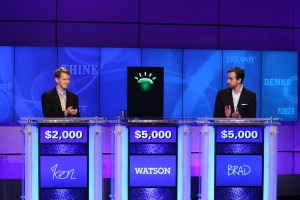Jeopardy spoilers—and boy, is that one phrase I never thought I’d type here—coming up next:
The IBM computer Watson began its brave effort to supersede humanity and thus elevate the level of sentience on Earth last night,* taking on Ken Jennings and Brad Rutter in the first night of a three-night Jeopardy competition. And I have to admit that the event, so far, lives up to the hype; this is one of the coolest things I expect to see on TV this year.
*You’ll excuse me if I hedge my bets a little here. Who knows how this thing is going to play out?

Sony Pictures Entertainment
The competition began with some exposition involving Watson’s size (big; it’s actually housed in a separate room in the building where the game was taped), the ambition of the project and the computer’s problem-solving algorithm. (The challenge, essentially, is not so much to get Watson to retain the info, but to comprehend clues and determine what information is being called for.)
Then the game play began, and at first it looked as if humanity would be extinguished as quickly and thoroughly as the twelve tribes of Battlestar Galactica. Watson—represented by a flat-screen “avatar,” on which it was personified by a picture of the Earth that it so hungrily wishes to possess—buzzed in quickly and coolly, identifying most of its answers to a level of certainty above 90%. One suspects that humans Jennings and Rutter, fumbling on their buzzers with their crude meat-thumbs, could hardly compete on speed.
Watson also bet the maximum on the first Daily Double, demonstrating that it was programmed to have balls.
Halfway into the first round, however, Watson began to stumble and miss. The fault, it seemed, was partly language comprehension. It seemed to have particular trouble parsing clues in a category about 20th-century decades, and the Tuned In Jrs. were also amused to see it arrive at “Harry Potter” for an answer that clearly called for “Voldemort.” (What? Computers are stupid!) But also, I have to wonder how thoroughly Watson was programmed for Jeopardy strategy. As far as I could tell, it chose categories pretty much at random, rather than sticking at categories where it had had success.
[Update: Readers on Twitter suggest that this may be a feature, not a bug; i.e., our flesh-brains are disoriented by switching categories, while a computer is unfazed. I’ll buy that, but I wonder if, for instance, Watson’s algorithm takes into account its current success rate in a particular category.]
And because it has no sensory input (it gets questions as text files), at one point Watson gave the same wrong answer Jennings just had. (Watson ranks possible answers in order of confidence, and the top three were displayed on screen. A human with ears would have heard Jennings’ wrong answer and gone to the next on the list—which in this case would have been correct.) I have to wonder, given Watson’s possible strategy weakness, how well it’s been programmed on such specific points of game strategy as wagering and choosing categories and dollar values.
By the end of the first night, it was close—conveniently, TV-cliffhanger close, with Rutter and Watson tied at $5000. The cynic in me has to wonder here—not whether Watson was programmed to keep things close but whether, this being a TV event, there was an effort to get Watson on air before it became too good. Presumably at some point, maybe very soon, Watson will be good enough to run the board without breaking a sweat. Then you don’t have a compelling TV show, and it’s off to the forced-labor silicon mines for all of us. As it is now, we have the hope of a high-ratings rematch next year.
Will savvy betting and sharp category-picking be the stone that save humanity against Robo-Goliath? I would tell you who I’m rooting for, but frankly, I think my laptop is listening.


